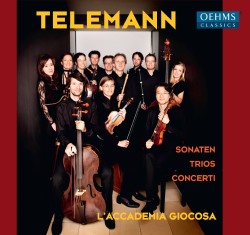
|
George Philipp TELEMANN (1681-1767)
Concerto François in G minor, TWV 53: g1 [16:14]
Trio in D major, TWV 42: D13 [6:58]
Trio in G minor, TWV 42: g13 [6:28]
Concerto in B flat major, TWV 43: B1 [6:14]
Concerto in D major, TWV Annex 51: D [12:25]
Sonata in E minor, TWV 50: 4 [13:34]
L’Accademia Giocosa
rec. October and November 2012, Studio 1, Bayerische Rundfunk, Munich
OEHMS CLASSICS OC897 [62:40]
Browsing, the other day, in Derek Watson’s 1991 Dictionary of Musical Quotations, I thought to look up Telemann, knowing that I would soon be writing this review. I found just two entries. The first was a comment by Telemann himself: “I have always aimed at facility. Music ought not to be an effort”. The second was an observation by Handel: “[He] could write a motet for eight voices more quickly than one could write a letter”. That Telemann wrote with facility is perhaps confirmed by the sheer size of his output. He was certainly amongst the most prolific of baroque composers. Being prolific and writing/composing with real - or reputed - facility are not qualities which necessarily ensure that the modern world will love an artist; the same goes for poets and painters. One thinks of Stravinsky’s comments on another prolific composer of the same era. Watson quotes one such “Vivaldi is greatly overrated – a dull fellow who could compose the same form over and so many times over”. Watson also cites words about Vivaldi from the Letters (1739) of Charles de Brosses (1709-77), “I heard him undertake to compose a concerto, with all the parts, with greater dispatch than a copyist can copy it”. We have now learned, or most of us have, that even if Vivaldi was prolific and even if he wrote with more than usual facility, he was still able – with considerable frequency – to write music of considerable beauty and power. Perhaps the same recognition has not yet been granted to Telemann. Indeed, Telemann perhaps labours under a couple of additional disadvantages. Firstly, he was a business-man of music, an entrepreneur determined to ensure that his work was properly remunerated. Secondly, he was very keen to make his music accessible to amateurs as well as professionals. For all these reasons - and perhaps there were others too - he is too often regarded as a kind of super-competent producer of music that has no great personality. As a result quite a lot of modern performances of Telemann’s compositions are inclined to be somewhat routine and mechanical, as if in tacit acknowledgement that the music doesn’t deserve a greater degree of interpretive attention.
However, both scholarship and performance are coming to the realization that there is much to admire and enjoy in the considerable body of Telemann’s work. The present disc is a fine example of such developments. The playing is radiantly vivacious and pretty well every bar is, without any sense of the excessive, richly characterized. This is a very long way from being merely routine.
L’Accademia Giocosa is an ensemble formed in 2010 by members of the Bavarian Radio Symphony Orchestra, eager to play ‘early music’, along with a number of freelance musicians. It appears on this CD in a variety of configurations, from the 10 musicians (2 baroque oboes, 2 baroque violins, 2 baroque violas, 1 baroque cello, I baroque bassoon, 1 harpsichord and 1 bas viol) deployed in the Concerto François to the 4 musicians (transverse flute, baroque violin, harpsichord, baroque cello) who play in the Trio in G minor. In whatever configuration, this is an ensemble that lives up to its name – in at least two senses. The choice of an Italian name is significant. The group’s attitude and its playing have much in common with the best of contemporary Italian baroque ensembles such as Europa Galante. Heard ‘blind’, as it were, I would probably have guessed that the performances on this disc were the work of an Italian group. As for ‘giocosa’ it seems a very apt epithet, not because their playing is ever less than fully serious, but because it always has a zest and playfulness. These are musicians who know very well that being serious is not the same thing as being solemn. As J.K. Huizinga argued in his great book Homo Ludens (1938), the highest form of playfulness, in music, “transports audience and performers alike out of ‘ordinary’ life into a sphere of gladness and serenity, which makes even ‘sad’ music a lofty pleasure”. On this disc, for example, the first and fourth movements of the Concerto François (both marked ‘Grave’) have a kind of redemptive radiance which makes the potentially ‘sad’ both glad and serene, in Huizinga’s terms.
Glyn Pursglove
 |
 |
|











